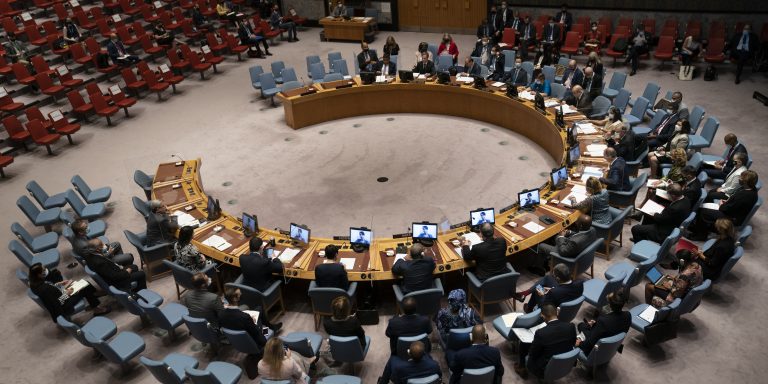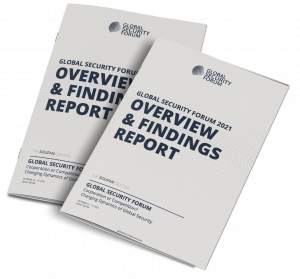INTELBRIEF
January 20, 2022
IntelBrief: As States Consider Competition Over Cooperation, American Leadership is at a Crossroads

Bottom Line Up Front
- Whereas three decades ago, in the aftermath of the Cold War, cooperation appeared to triumph over competition, in recent years the latter has increasingly come to define political, economic, and security spheres.
- The onset of COVID-19 has disrupted economic patterns, supply chains, and international and multilateral relationships.
- Some of the most critical challenges we face today lend themselves towards cooperation, including global public health, the climate crisis, conflict resolution, and international trade.
- As states look to rebuild economies, recover resilience, and regenerate alliances, Washington should not lose sight of the importance of cooperation.
Today’s international system presents many opportunities for states to opt for cooperation in lieu of competition, despite many examples of leaders choosing the contrary. This applies to America’s friends and foes alike. Whereas three decades ago, in the aftermath of the end of the Cold War, cooperation appeared to triumph over competition, in recent years the latter has increasingly come to define political, economic, and security spheres. As America approaches this crossroads, she should proceed with caution. Only twenty years ago, such dynamics looked very different for the United States. Immediately following the tragic attacks of September 11, 2001, America experienced an extraordinary moment of international unity and goodwill. Countries and communities around the world stood with America in the face of terrorism and tragedy. The United Nations Security Council (UNSC) took unanimous action just shortly after the attacks. Washington’s closest military allies in the North Atlantic Treaty Organization (NATO) invoked Article 5, the collective defense clause, for the first and only time in the Alliance’s history. Over 50 countries would join one of the largest coalitions in history to endeavor to ensure Afghanistan would never again become a safe haven for terrorists.
Today, we know all too well how this chapter ended, and the United States now faces an entirely different global security landscape. The way the U.S. left Afghanistan will have myriad follow-on effects: on international security, on transnational terrorism, and on democratic governance and human rights in Afghanistan and elsewhere. The manner in which the U.S. withdrew will also test relationships with key allies in Europe and around the world—many of whom felt blindsided at best, betrayed at worst, by Washington’s actions, not only in Afghanistan but further afield. And this all comes on the heels of four years of the Trump administration dismantling critically important diplomatic infrastructure and withdrawing from crucial international agreements, generating deep distrust in the reliability of America’s commitments. The challenges today are plenty. The onset of COVID-19 has disrupted economic patterns, supply chains, and international and multilateral relationships. Since the onset of the pandemic, countries have competed and cooperated to secure protective gear, vaccines, and set out to impose and manage travel restrictions and protective measures, replacing many traditional aspects of their relationships with a new “pandemic diplomacy.” The global economic uncertainty brought on by these actions and responses looms large.
The current health and economic challenges are formidable in their own right, but the complex interconnections with security further complicate matters. The ongoing pandemic and economic uncertainty provide a bevy of grievances for violent extremist actors to exploit. In this strained context, vulnerable populations are particularly susceptible to diverse terrorist narratives, including a now more confident al-Qaeda, numerous Islamic State (IS) affiliates, and an emboldened violent far-right movement gaining traction across North America, Europe, Australia, and beyond. What’s more, conventional security challenges remain. The rise of China has led to shifting relationships between countries focused on maintaining influence in the Indo-Pacific region. Against this backdrop, the importance of uniting and reconnecting at the individual, organizational, national, and multilateral level is paramount if the international community is to stave off the ill-effects of political polarization, which has become more pronounced during the COVID-19 pandemic. Some of the most critical challenges we face today lend themselves towards cooperation, including global public health, the climate crisis, conflict resolution, and international trade. The pandemic has prompted tremendous innovation in human, professional, and political relationships. As states and regional organizations struggle to identify and react to persistent challenges, the pandemic has forced global leaders and practitioners to rethink diplomacy and engagement, accelerated in many ways by the emergence of new technologies.
Even in the aftermath of the Taliban’s seizure of control in Afghanistan, opportunities remain for collaboration and further strengthening of alliances and relationships, as well as for defending the modest gains of the last two decades on human rights and the participation of women and girls in public and political life. For example, Qatar’s role in evacuation efforts and in securing the airport in the wake of the U.S. withdrawal demonstrate the outsized role that some countries have played in coming to Washington’s aid. The international community also still has the opportunity to bring perpetrators of ISIS crimes to justice and hold them accountable for the atrocities they committed; international cooperation is required to follow through on the imperative to uphold the rule of law and provide some succor to the victims of ISIS’s brutality. The prosecution of terrorists at national and international levels remains a complex challenge, but important progress has been made, and states can and should do more to support joint efforts and information sharing in this regard. American leadership is now at a crossroads, grappling to maintain—and even reaffirm—U.S. leadership and influence in a markedly different world. As states look to rebuild economies, recover resilience, and regenerate alliances, Washington should not lose sight of the importance of cooperation. While much contemporary analysis focuses on the diffuse range of threats, there are also possible points of collaboration that can inform public and private sector leaders and policymakers.
